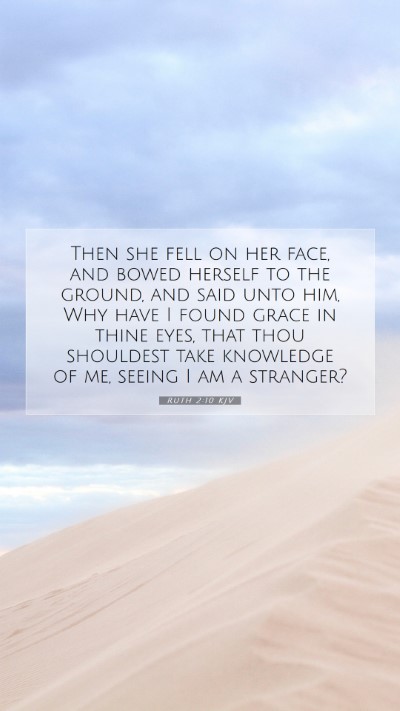Old Testament
Genesis Exodus Leviticus Numbers Deuteronomy Joshua Judges Ruth 1 Samuel 2 Samuel 1 Kings 2 Kings 1 Chronicles 2 Chronicles Ezra Nehemiah Esther Job Psalms Proverbs Ecclesiastes Song of Solomon Isaiah Jeremiah Lamentations Ezekiel Daniel Hosea Joel Amos Obadiah Jonah Micah Nahum Habakkuk Zephaniah Haggai Zechariah MalachiRuth 2:10 Meaning
What is the meaning of Ruth 2:10?
Then she fell on her face, and bowed herself to the ground, and said unto him, Why have I found grace in thine eyes, that thou shouldest take knowledge of me, seeing I am a stranger?
Ruth 2:10 Bible Verse Meaning
Bible Verse Meaning and Interpretation for Ruth 2:10
Ruth 2:10 states, "Then she fell on her face, bowed down to the ground, and said to him, 'Why have I found favor in your eyes that you should take notice of me, since I am a foreigner?'" This verse is pivotal in the narrative of Ruth, highlighting the themes of grace, humility, and the social dynamics of the time.
Scripture Analysis and Commentary
Understanding the Context
The Book of Ruth unfolds during the time of the Judges when Israel was in moral decay. Ruth, a Moabite woman, exhibits loyalty and determination, choosing to glean in the fields of Boaz to provide for herself and Naomi, her mother-in-law. This verse captures her reaction upon receiving kindness from Boaz, illustrating her surprise and humility as a foreigner.
Commentary Insights
- Matthew Henry's Commentary: Henry notes the poignancy of Ruth's acknowledgment of her outsider status, emphasizing her faith and character; her question reveals a sense of wonder at Boaz's kindness. He highlights the importance of humility in seeking grace.
- Albert Barnes' Commentary: Barnes stresses the cultural significance of Ruth's foreignness and her vulnerability as a widow. He reflects on the blessings that come to those who trust in God and act faithfully, which Ruth exemplifies.
- Adam Clarke's Commentary: Clarke delves into the customs of gleaning and the societal norms regarding foreigners, pointing out Ruth's courageous journey from Moab to Bethlehem, showcasing her resilience and dependency on God's provision through Boaz.
In-Depth Bible Verse Analysis
Ruth's exclamation is not merely a reflection of her surprise at Boaz's kindness but also an invitation to explore the grace extended to those considered outsiders in society. Her question evokes multiple layers of biblical meaning, emphasizing God's universal grace and the breaking down of barriers.
Significance of Ruth 2:10
The act of bowing down signifies reverence and submission. Ruth’s recognition of her foreign status also serves to amplify the narrative of inclusiveness found throughout Scripture. This verse invites reflection on how grace can be found in unexpected places and among unexpected people.
Application of Ruth 2:10 in Daily Life
For modern readers, Ruth 2:10 serves as a reminder to practice humility and gratitude. It encourages individuals to be open to the unexpected kindness of others, regardless of societal norms. Furthermore, it prompts a reflection on how one can extend grace to those who may feel like outsiders in various contexts today.
Additional Themes and Lessons from Ruth
- The importance of loyalty and commitment in relationships.
- The role of providence and divine guidance in difficult circumstances.
- The transformational power of love and acceptance across cultural boundaries.
Cross References
- Matthew 15:27 - The faith of a Canaanite woman emphasizes the theme of grace towards outsiders.
- Galatians 3:28 - Highlights the equality of all believers in Christ, transcending cultural barriers.
- James 2:5 - Reinforces the notion that God's kingdom welcomes the poor and needy, regardless of their background.
Conclusion
Ruth 2:10 intricately weaves together themes of humility, grace, and social dynamics, enriching our understanding of biblical narrative and its implications for modern life. By studying this verse, readers can explore deeper meanings and applications that resonate with their own journeys in faith.


